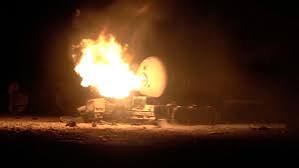US Bomb Yemeni Fuel Port of Rass Issa

US has struck the Yemeni fuel port of Ras Issa, resulting in a devastating death toll, with Houthi rebels reporting at least 80 fatalities and 150 wounded, marking the deadliest single incident of Washington’s 15-month campaign in Yemen.
The strikes, confirmed by the US military, aimed to disrupt the supply lines and funding streams for the Houthis, who control significant territory in the war-torn nation.
Images circulating via Houthi-run Al-Masirah TV depicted large fires raging at the fuel terminal along the Red Sea following the extensive bombardment.
Rescue efforts are ongoing, according to Houthi health ministry spokesman Anees Alasbahi, suggesting the death toll is likely to climb further.
The US military justified the strikes as a necessary measure to degrade the Houthis’ ability to wage attacks and maintain control. However, the high civilian casualty count has sparked immediate and widespread condemnation, raising concerns about the proportionality of the response and the impact on Yemen’s already desperate humanitarian situation.
“The American military buildup and continued aggression against our country will only lead to more counterattack and attack operations, clashes and confrontations,” cautioned Houthi military spokesman Brigadier Yahya Saree, speaking at a protest in Sanaa denouncing the strikes. His warning proved prescient as the Houthis quickly responded with missile attacks targeting Israel and, crucially, two US aircraft carriers. Israel’s military confirmed intercepting a missile launched from Yemen.
This escalation marks a significant turning point in the conflict. While the US has been involved in supporting the Saudi-led coalition against the Houthis for years, the intensification of direct strikes under President Donald Trump has drawn increased scrutiny. The Houthis’ reciprocal attacks on US naval assets raise the stakes considerably, threatening to broaden the conflict beyond Yemen’s borders and potentially draw in regional powers.
The strikes on Ras Issa, a vital fuel import point, will undoubtedly exacerbate the already dire humanitarian crisis in Yemen, where millions are on the brink of famine. Disrupting fuel supplies will hinder aid delivery and essential services, further compounding the suffering of the civilian population.
The international community is facing mounting pressure to de-escalate the conflict and pursue a diplomatic solution. This latest episode underscores the need for a comprehensive strategy addressing the underlying causes of the conflict, prioritizing the protection of civilians, and ensuring unimpeded access for humanitarian aid. The risk of a wider regional conflagration looms large unless all parties commit to a path of de-escalation and negotiation.









